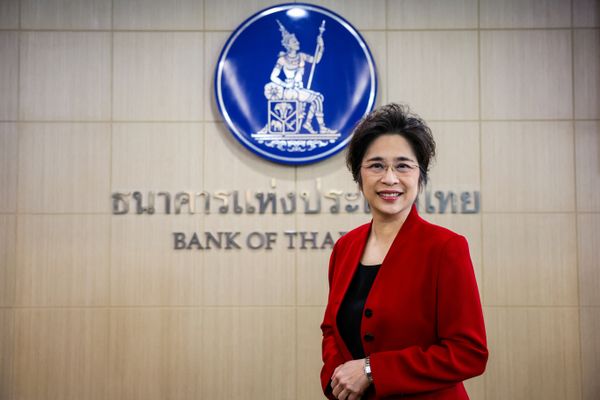BANGKOK, July 2 — Thailand's economy faces a challenging second half of 2025 due to uncertainty about the United States (US) tariffs, a central bank deputy governor said today, just as the country is caught in a new wave of domestic political turmoil.
Under these circumstances, Roong Mallikamas, one of the two candidates short-listed to lead the Bank of Thailand from October, said that the central bank's monetary policy should remain accommodative to support the economy.
"We will see a tailing of the economic growth in the second half of this year, mainly due to the tariff effects.
"We anticipate a marked slowdown in economic activities. I think basically the tariff effects also magnify ... our country's structural problems," she told Reuters in an interview.
Southeast Asia's second-largest economy has lagged regional peers since the pandemic, growing only 2.5 per cent last year. The central bank forecast the economy will expand by a slower 2.3 per cent in 2025, bogged down by high levels of household debt and tepid consumption.
A threat by the US to impose a 36 per cent tariff on imports from Thailand has added to the challenges facing the floundering economy. Thai Finance Minister Pichai Chunhavajira is currently in Washington for negotiations.
The talks, ahead of a July 9 deadline to negotiate a trade deal with the US, come as Thailand has been plunged into renewed political chaos after Prime Minister Paetongtarn Shinawatra was suspended from office by the Constitutional Court on Tuesday.
Roong noted that political uncertainty is currently not an elevated concern, with government spending and trade negotiations with the US likely to continue without interruption.
After cutting interest rates in October, February and April, the Bank of Thailand last week left its key interest rate unchanged at 1.75 per cent, outlining the need to save some policy ammunition in case the economy slowed more than expected.
She added that members of the BOT's monetary policy committee feel that policy should be at an accommodative level to support the economy. Roong is not part of the seven-member MPC.
"I think the pause was just to say that this is to assess what we have already taken. Another issue is how to maximise the remaining policy space that we have
"If the outlook deteriorates, if I were an MPC member, I would not be reluctant to ease," she said. The BOT will next review policy on August 13.
A softer baht would also support the economy, and the central bank would aim to ensure that the currency's movements are not influenced by non-fundamental factors, like gold prices. The baht has risen by 5.7 per cent against the U.S. dollar so far this year.
Roong said that while recent negative inflation readings did not signal the economy was in deflation, they are a "reflection of very soft demand and it's more of a concern that the momentum of the economy is rather slow,".
[caption id="attachment_401435" align="aligncenter" width="1149"] Prime Minister Paetongtarn Shinawatra (centre) chairs a policy committee meeting on economic stimulus projects to discuss measures to address global economic volatility caused by trade wars and tariff policies imposed by major powers, at the Government House in Bangkok, Thailand, on May 19, 2025. — Picture via FACEBOOK/ING SHINAWATRA[/caption]
Prime Minister Paetongtarn Shinawatra (centre) chairs a policy committee meeting on economic stimulus projects to discuss measures to address global economic volatility caused by trade wars and tariff policies imposed by major powers, at the Government House in Bangkok, Thailand, on May 19, 2025. — Picture via FACEBOOK/ING SHINAWATRA[/caption]
'Divert confrontations'
The ruling Pheu Thai party, which took power in 2023, has long been at loggerheads over rate cuts and the currency with the central bank, currently led by Governor Sethaput Suthiwartnarueput, whose five-year term ends in September.
Last year, before she became Prime Minister, Paetongtarn said that central bank independence was an obstacle to solving economic problems.
Roong, 56, said that there was a need for the central bank to communicate and collaborate more deeply with the government.
"When you talk early, a lot of things can be resolved before it gets to the point where it is more confrontational.
"I would hope to divert a lot of confrontations," said the banking veteran who has spent nearly three decades at the central bank.
Roong, who holds a Ph.D. in economics from the Massachusetts Institute of Technology, is shortlisted for the top job along with Vitai Ratanakorn, 54, president and chief executive of Government Savings Bank, Thailand's largest state-run lender.
Facing down concerns over assertive governments pushing the central bank to toe their line, she underlined the need for open dialogue.
"You can voice your concerns, and you can share freely what you think. I think that is independence
"It is not about going separate ways," Roong said.
— Reuters
[caption id="attachment_337219" align="aligncenter" width="1149"] Thailand's central bank is seen at the Bank of Thailand in Bangkok, Thailand April 26, 2016. — Picture via REUTERS[/caption]
Thailand's central bank is seen at the Bank of Thailand in Bangkok, Thailand April 26, 2016. — Picture via REUTERS[/caption]




